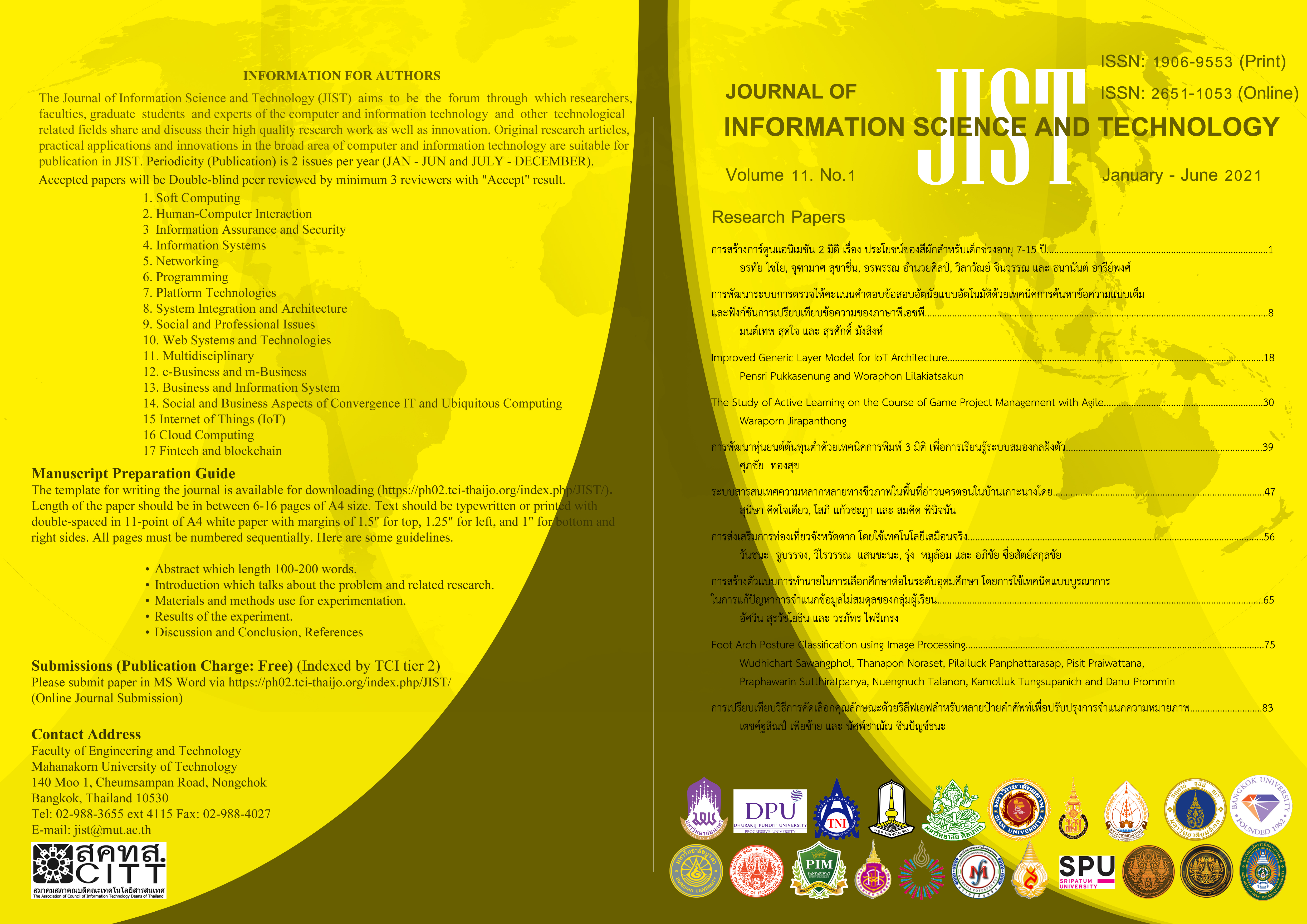Development of an Automated subjective answer scoring System with full-text search technique and PHP text comparison function
Main Article Content
Abstract
A subjective or written test is a type of test that allows learners to demonstrate better than other forms of thinking, ideas, analysis and synthesis of knowledge gained from learning. An efficient, automated subjective answer scoring system can reduce errors, injustice, fatigue and the inaccuracy in examining the exam. This paper presents the development of an automated scoring system for subjective answers for the secondary school level on the Internet to support teachers with the need to create content-based and appropriate subjective exams, and automatically score subjective answers. This system uses a Full-text Search technique and PHP Similar Text functions, and is used for testing in secondary education school 1) Kunnatee Ruttharam Witthayakhom School, Bangkok 2) Mueng Nakhonnayok Schook, Nakhonnayok be under Office of the Basic Education Commission. The test results showed = 4.32 that the teachers were satisfied with the results of the grading system at the good.
Article Details
This work is licensed under a Creative Commons Attribution-NonCommercial-NoDerivatives 4.0 International License.
I/we certify that I/we have participated sufficiently in the intellectual content, conception and design of this work or the analysis and interpretation of the data (when applicable), as well as the writing of the manuscript, to take public responsibility for it and have agreed to have my/our name listed as a contributor. I/we believe the manuscript represents valid work. Neither this manuscript nor one with substantially similar content under my/our authorship has been published or is being considered for publication elsewhere, except as described in the covering letter. I/we certify that all the data collected during the study is presented in this manuscript and no data from the study has been or will be published separately. I/we attest that, if requested by the editors, I/we will provide the data/information or will cooperate fully in obtaining and providing the data/information on which the manuscript is based, for examination by the editors or their assignees. Financial interests, direct or indirect, that exist or may be perceived to exist for individual contributors in connection with the content of this paper have been disclosed in the cover letter. Sources of outside support of the project are named in the cover letter.
I/We hereby transfer(s), assign(s), or otherwise convey(s) all copyright ownership, including any and all rights incidental thereto, exclusively to the Journal, in the event that such work is published by the Journal. The Journal shall own the work, including 1) copyright; 2) the right to grant permission to republish the article in whole or in part, with or without fee; 3) the right to produce preprints or reprints and translate into languages other than English for sale or free distribution; and 4) the right to republish the work in a collection of articles in any other mechanical or electronic format.
We give the rights to the corresponding author to make necessary changes as per the request of the journal, do the rest of the correspondence on our behalf and he/she will act as the guarantor for the manuscript on our behalf.
All persons who have made substantial contributions to the work reported in the manuscript, but who are not contributors, are named in the Acknowledgment and have given me/us their written permission to be named. If I/we do not include an Acknowledgment that means I/we have not received substantial contributions from non-contributors and no contributor has been omitted.
References
Ministry of Education, Basic Education Core Curriculum 2008. Bangkok: The Agricultural Cooperative Federation of Thailand Ltd., 2008.
Ministry of Education, Guidelines for measuring and evaluating learning outcomes According to the core curriculum of basic education in 2008. Bangkok: The Agricultural Cooperative Federation of Thailand Ltd., 2014.
Rasmus Lerdorf, “SEEDING UP THE WEB WITH PHP 7,” [Online]. Available: http://talks.php.net/ singapore15#. [Accessed: Oct. 25, 2020].
W3resource, “MySQL Full text search,” [Online]. Available: https://www.w3resource.com/mysql/ mysql-full-text-search-functions.php. [Accessed: Nov. 7, 2020].
Anuradha K.T. and Sivakaminathan R., “Enhancing Full text Search Capability in Library Automation Package: A Case Study with Koha and Greenstone Digital Library Software,” [Online]. Available: http://139.162.175.13/greenstone/collect/toolbox/index/assoc/HASHf64d.dir/Full%20Text%20Search%20Capability%20In%20Library%20Automation.pdf?fbclid=IwAR0Y09_zFRih-qmBdfOjr8z0lhkQUf MhcrSJTmGEUoZJYwEKKMc501bYJZc. [Accessed: Nov. 7, 2020].
Sommart Angkaseraneekul, “Automatic examination of the Thai language subjective exam,” Master of Science degree, Computer Science, Kasetsart University, 2012.
Bloom, B.S. and others, “Taxonomy of Educational Objectives Cognitive, the classification of educational goals Handbook I : Cognitive Domain,” New York : McKay, 1956.
Engelhard, J.G., “Examining rater errors in the assessment of written composition with a many-faceted Rasch model.” Journal of Educational Measurement, Volume 31, Issue 2 pp. 93-112, 1994.
Tuckman, B.W., “Measuring Education Outcomes Fundamentals of Testing,” New York: Harcourt Bruce Jovanovich, 1975.
Rattana Siripanit, “Principles for creating a psychological and educational test,” Bangkok: Chareonvitaya Printing, 1990.
Sasitorn Leksuksri, “The results of subtests with subjective and multiple choice questions on academic achievement quantity guesswork and learning persistence mathematics in secondary 3,” Srinakharinwirot University, 1982.
Uthumporn, “Questionnaire: Creation and Use,” Bangkok: Faculty of Education, Chulalongkorn University, 1987.



